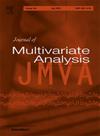半参数典型相关分析的多秩似然
IF 1.4
3区 数学
Q2 STATISTICS & PROBABILITY
引用次数: 0
摘要
许多多变量数据分析侧重于评估两组变量之间的相关性,而不是评估每组变量之间的相关性。典型相关分析(CCA)是一种经典的数据分析技术,用于估计描述这些集之间相关性的参数。然而,基于传统CCA的推理过程依赖于所有变量都是联合正态分布的假设。我们提出了一种半参数的CCA方法,其中每个变量集的多元边际可以是任意的,但变量集之间的相关性由参数模型描述,该模型提供了依赖性的低维摘要。虽然所提出的模型中的最大似然估计是棘手的,但我们提出了两种估计策略:一种是对模型使用伪似然,另一种是使用马尔可夫链蒙特卡罗(MCMC)算法,该算法为集间依赖性参数提供贝叶斯估计和置信区域。MCMC算法来源于一个多秩似然函数,它只使用观测数据中的部分信息,以换取对多元边界的自由假设。我们将提出的贝叶斯推理程序应用于巴西的气候数据和材料和通信市场部门的月度股票回报。本文章由计算机程序翻译,如有差异,请以英文原文为准。
The multirank likelihood for semiparametric canonical correlation analysis
Many analyses of multivariate data focus on evaluating the dependence between two sets of variables, rather than the dependence among individual variables within each set. Canonical correlation analysis (CCA) is a classical data analysis technique that estimates parameters describing the dependence between such sets. However, inference procedures based on traditional CCA rely on the assumption that all variables are jointly normally distributed. We present a semiparametric approach to CCA in which the multivariate margins of each variable set may be arbitrary, but the dependence between variable sets is described by a parametric model that provides low-dimensional summaries of dependence. While maximum likelihood estimation in the proposed model is intractable, we propose two estimation strategies: one using a pseudolikelihood for the model and one using a Markov chain Monte Carlo (MCMC) algorithm that provides Bayesian estimates and confidence regions for the between-set dependence parameters. The MCMC algorithm is derived from a multirank likelihood function, which uses only part of the information in the observed data in exchange for being free of assumptions about the multivariate margins. We apply the proposed Bayesian inference procedure to Brazilian climate data and monthly stock returns from the materials and communications market sectors.
求助全文
通过发布文献求助,成功后即可免费获取论文全文。
去求助
来源期刊

Journal of Multivariate Analysis
数学-统计学与概率论
CiteScore
2.40
自引率
25.00%
发文量
108
审稿时长
74 days
期刊介绍:
Founded in 1971, the Journal of Multivariate Analysis (JMVA) is the central venue for the publication of new, relevant methodology and particularly innovative applications pertaining to the analysis and interpretation of multidimensional data.
The journal welcomes contributions to all aspects of multivariate data analysis and modeling, including cluster analysis, discriminant analysis, factor analysis, and multidimensional continuous or discrete distribution theory. Topics of current interest include, but are not limited to, inferential aspects of
Copula modeling
Functional data analysis
Graphical modeling
High-dimensional data analysis
Image analysis
Multivariate extreme-value theory
Sparse modeling
Spatial statistics.
 求助内容:
求助内容: 应助结果提醒方式:
应助结果提醒方式:


